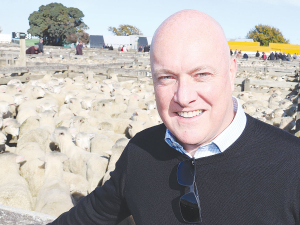Editorial: Fireworks or damp squib?
OPINION: November 7 has been set by Christopher Luxon as ‘E day’ – election day.
 National leader Chris Luxon says an extension to the RSE is on the cards if there is a change of government at next year's election.
National leader Chris Luxon says an extension to the RSE is on the cards if there is a change of government at next year's election.
National Party leader Christopher Luxon has indicated an extension to the Recognised Seasonal Employer (RSE) scheme is on the cards if his party comes into government next year.
On a recent visit to Seeka Holdings in Te Puke, Luxon said the kiwifruit industry is a "fantastic story" of a business that offers good wages and career options - but the sector was facing a major labour shortage.
Luxon said there were two things the Government could do to assist the industry with the challenges it faced. This included introducing a multi-year work visa for RSE seasonal workers and increasing the current one-year visa to three years. He claims National’s ideas will help address the labour shortage.
“The problem is that the Government is not doing a good enough job to open up the immigration settings so businesses involved in the sector can maximise opportunities to make a lot more money and maximise their returns,” Luxon explained. “This would not only benefit those working in the industry but New Zealand as a whole.”
He believes that increasing available labour to the kiwifruit sector would also help with current issues it is experiencing around quality issues.
Seeka chief executive Michael Franks said, like most horticultural produce companies, Seeka was extremely short of labour, especially during peak demand periods.
“We employ about 4,500 seasonal workers each year, which complements our 800 permanents, and also have another 1,500 who indirectly work for us.”
Meanwhile, Hort NZ chief executive Nadine Tunley says the organisation supports any move to ensure the ongoing success of the RSE scheme and give growers access to a skilled seasonal workforce, as growers look to the next harvest season.
“For the past 15 years, the RSE scheme has helped Pacific economies to develop and communities to flourish, through the skills RSE employees develop and the money that they earn,” she adds.
“For horticulture in New Zealand, the RSE scheme has supported growth which in turn has increased permanent employment opportunities for New Zealanders."
Tunley says Horticulture New Zealand and other industry groups will continue discussions with the governments of New Zealand and the Pacific, ahead of decisions due any day now about how the RSE scheme will operate for the coming harvest season.
Meanwhile, she added that there is ‘no tolerance’ for employer behaviour that is contrary to the spirit of the RSE scheme.
“We must ensure the scheme continues to operate successfully for the Pacific, as well as for New Zealand.”